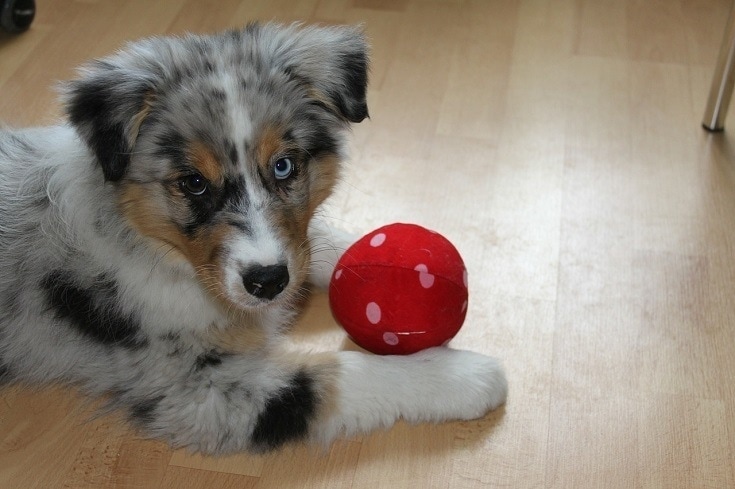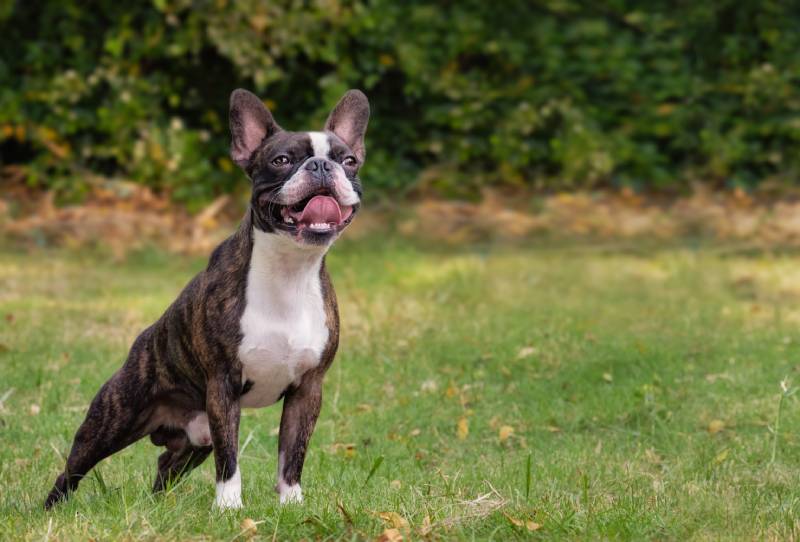How to Keep an Australian Shepherd Busy: 7 Great Options
By Brooke Bundy
Updated on

Australian Shepherds are a working breed with a history of herding sheep. Given their enormous brain capacity and active tendencies, Aussies really need to be put to work. Otherwise, they may use their smarts for destructive ends. Here are 7 ways to keep your Aussie engaged whether they’re with you playing interesting games, or beside you while you work.
Top 7 Tips on How to Keep an Australian Shepherd Busy
1. Take Them on Daily Walks
As a high-energy breed, the Australian Shepherd requires lots of daily exercise. Aim for at least 1-2 hours of walking each day for adults. Half an hour might suffice if you have a puppy who’s six months old or younger. If you have a yard, you can let them expend some of their exercise time by romping through the grass, but just make sure they’re not taking a nap when you think they’re playing. Running with your Aussie is a great way for both of you to stay fit but keep them off their track until after their first birthday in order to reduce the risk of injuring their growing joints.

2. Let Them Play Independently in the Yard
Aussies like to rove over an open space, driving birds and squirrels into the corners of your yard. In the old days, they herded sheep in this manner, and Aussie owners now say that their dog sometimes uses this maneuver to guide their children instead. Unless your Aussie has a knack for eating strange objects, you can let your Aussie play for an hour or two with loose supervision while you accomplish your tasks indoors, such as cleaning or making that important phone call. Just make sure your yard is completely fenced with no way that they could accidentally sneak out in pursuit of prey.
3. Rotate Their Toys
Like toddlers, dogs can find new interest in toys that they haven’t seen in a while. Plus, having a limited available toy collection makes cleaning up much faster.

4. Play Fetch
Your Aussie will love to play fetch with you, indoors or outside. All you need is a frisbee or a ball to have a great time.
5. Teach Them How to Play Hide and Seek
If your Aussie knows how to sit and stay, you can teach them this beloved children’s game. Instruct your Aussie to, “Sit.” Once they obey, say, “Stay,” and slowly walk away. Find your hiding place, and then give them the command to come find you. Your Aussie will probably greet you like they haven’t seen you in hours.

6. Buy Them a Treat Puzzle
These activities hide treats for your Australian Shepherd to find. Like crossword puzzles for humans, treat puzzles keep your Aussie’s brain sharp. Some pet parents stuff their dog’s food into the puzzle to give a healthy pause in between eating so they can’t gulp down all their kibble at once.
7. Train Your Aussie to Help You Around the House
Despite their smarts, your Aussie probably won’t be wielding a broom and dustpan any time soon. However, you can train your Aussie to help you out with light chores, such as cleaning up their toys and bringing you items from the refrigerator.
Conclusion
It’s important to keep your Australian Shepherd busy. Boredom frustrates your dog and can lead them into destructive behaviors such as chewing on inappropriate items or excessive barking. You should make sure your dog receives at least 1-2 hours of exercise outside every day so they can expend their energy in a healthy way. Treat puzzles and chores are great activities for Australian Shepherds, so give a wide variety a try to see what they like best.
Featured Image Credit: LightField Studios, Shutterstock











